|
Books Should Be Free Loyal Books Free Public Domain Audiobooks & eBook Downloads |
|
|
Books Should Be Free Loyal Books Free Public Domain Audiobooks & eBook Downloads |
|
Literature |
|---|
|
Book type:
Sort by:
View by:
|
By: Robert Louis and Fanny van de Grift Stevenson | |
|---|---|
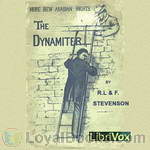 More New Arabian Nights: The Dynamiter
More New Arabian Nights: The Dynamiter
More New Arabian Nights: The Dynamiter (1885) is a collection of linked short stories by Robert Louis Stevenson and Fanny Vandegrift. Three gentlemen of little means and no occupation meet in the Bohemian Cigar Divan, a tobacco shop with couches to sit and smoke. They read of a reward offered for information as to the whereabouts of a man with big moustaches and a sealskin coat. They agree among themselves that they will separate and search for the man so as to claim the reward. The stories that follow concern their adventures... | |
By: Robert Louis Stevenson (1850-1894) | |
|---|---|
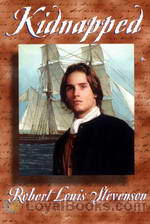 Kidnapped
Kidnapped
Kidnapped is the story of a 16-year old young man who is searching for his true birthright and is determined to make a fortune after the death of his parents. This timeless tale by Robert Louis Stevenson follows the life of David Balfour who leaves his home in Scotland after the death of his parents. First he meets his uncle for the first time in his life. His uncle is a very mean person who, at first, tried to kill David by devious means but then got him kidnapped onto a slave ship. In the ship, David makes friends with a Scottish rebel and together they successfully defeat the ship’s crew... | |
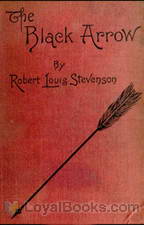 The Black Arrow; a Tale of Two Roses
The Black Arrow; a Tale of Two Roses
The Black Arrow tells the story of Richard (Dick) Shelton during the Wars of the Roses: how he becomes a knight, rescues his lady Joanna Sedley, and obtains justice for the murder of his father, Sir Harry Shelton. Outlaws in Tunstall Forest organized by Ellis Duckworth, whose weapon and calling card is a black arrow, cause Dick to suspect that his guardian Sir Daniel Brackley and his retainers are responsible for his father’s murder. Dick’s suspicions are enough to turn Sir Daniel against him, so he has no recourse but to escape from Sir Daniel and join the outlaws of the Black Arrow against him... | |
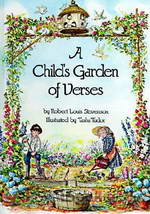 A Child's Garden of Verses
A Child's Garden of Verses
Beloved by many generations of children, A Child’s Garden of Verses is a beautiful collection of children’s poetry. Sometimes thoughtful, sometimes whimsical, but always fun. | |
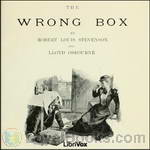 The Wrong Box
The Wrong Box
The Wrong Box is a comedy about the ending of a tontine (a tontine is an arrangement whereby a number of young people subscribe to a fund which is then closed and invested until all but one of the subscribers have died. That last subscriber then receives the whole of the proceeds). The story involves the last two such survivors and their relations, a train crash, missing uncles, surplus dead bodies and innocent bystanders. A farce really. | |
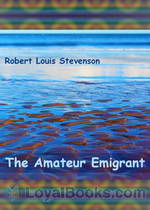 The Amateur Emigrant
The Amateur Emigrant
In July 1879, Robert Louis Stevenson left Scotland to meet his future wife in her native California. Leaving by ship from Glasgow, Scotland, he determined to travel in steerage class to see how the working classes fared. At the last minute he was convinced by friends to purchase a ticket one grade above the lowest price, for which he was later thankful after seeing the conditions in steerage, but he still lived among the ‘lower’ classes. His comments on the experience make interesting reading. His father however was so shocked at the thought of his son associating with people ‘beneath him’ that the work was not published for a number of years, | |
 Olalla
Olalla
“Olalla” was a “shilling shocker” written for the Christmas season in 1885, just before the publication of Stevenson’s Dr. Jekyll and Mr. Hyde. The nameless protagonist of this Gothic tale, a wounded soldier, goes to the Spanish countryside to recuperate. He finds himself enthralled by the beautiful Olalla, the daughter of his hostess, whose family conceals a terrible secret. | |
 New Arabian Nights
New Arabian Nights
New Arabian Nights is a collection of short stories which include Robert Louis Stevenson's earliest fiction as well as those considered his best work in the genre. The first and longest story stars Prince Florizel of Bohemia who appears in the later collection of stories "More New Arabian Nights: The Dynamiter." | |
 Island Nights' Entertainments
Island Nights' Entertainments
A marvelous depiction of two sides of South Sea Islands' life through three separate tales. One, the experience of the incoming British keen to live free and exploit the innocent; the other the supernatural as perceived by Stevenson working in the lives of the natives. One tale carries the germ of the story of Madame Butterfly, since become a part of Western culture. Another is an extraordinary retelling of a German horror story transposed to a South Sea Island setting. The last is an effort of the pure Stevensonian imagination and there can be nothing better. | |
 Wrecker
Wrecker
The Wrecker (1892) is a novel written by Robert Louis Stevenson in collaboration with his stepson Lloyd Osbourne. The story is a 'sprawling, episodic adventure story, a comedy of brash manners and something of a detective mystery'. It revolves around the abandoned wreck of the Flying Scud at Midway Island. Clues in a stamp collection are used to track down the missing crew and solve the mystery. It is only in the last chapter that different story elements become linked. | |
 Travels with a Donkey in the Cevennes
Travels with a Donkey in the Cevennes
A classic of travel writing, this book recounts Stevenson's adventures on an extended walk through uplands and mountains in south-western France. Humorous on his own failings as a traveller, and on his travails with Modestine the self-willed donkey, it is also an exploration of peasant life in an area marked by the violence of the wars of religion. This version includes the fragment "A mountain town in France", originally intended as the opening chapter, but often omitted and published as a separate essay. | |
 Inland Voyage
Inland Voyage
As a young man, Stevenson wished to be financially independent and began his literary career by writing travelogues. This is his first published work, written at a time when travel for pleasure was still a rarity. He and a friend traveled by canoe through France and Belgium and he relates how they were thrown in jail, mistaken for traveling salesmen and became embroiled in gypsy life. | |
 Not Yet my Soul
Not Yet my Soul
15 recordings of Not Yet my Soul by Robert Louis Stevenson. This was the Fortnightly Poetry project for May 19, 2013.Robert Louis Balfour Stevenson (13 November 1850 – 3 December 1894) was a Scottish novelist, poet, essayist, and travel writer. His most famous works are Treasure Island, Kidnapped, and Strange Case of Dr Jekyll and Mr Hyde.The following poem comes from his collection entitled Underwoods, first published in 1887. | |
By: Robert Louis Stevenson and Lloyd Osbourne (1850-1894) | |
|---|---|
 The Ebb-Tide
The Ebb-Tide
Three men down on their luck in Tahiti agree to ship out on a vessel whose officers have died of smallpox. Their desperate venture inspires them to a further idea: they will steal the schooner and its cargo of champagne, sell them, and live a plentiful life. The thought is intoxicating... and so is the cargo, which they sample. Inattention nearly brings them to grief in a sudden storm. This sobering experience is followed by another - apparently the dead officers had a similar ambition! - and their dreams of riches vanish... | |
By: Robert Lynd (1879-1949) | |
|---|---|
 Old and New Masters
Old and New Masters
Jane Austen, WB Yeats, Chesterton, Shaw... these are personal and intelligent short essays on a selection of great (and great-ish) writers: some well known, and some a bit more obscure to the average reader today. Robert Lynd (1879 – 1949) is best known as a literary essayist and Irish nationalist. He published many essays, all written in an easy, conversational style. Lynd was an essayist after the manner of Charles Lamb, and deserves to be better known. A complete list of his works is available at Wikipedia: http://en.wikipedia.org/wiki/Robert_Wilson_Lynd | |
By: Robert Sheckley (1928-2005) | |
|---|---|
 The Status Civilization
The Status Civilization
Will Barrent awakes without memories just before being deposited on Omega, a planet for criminals where the average life expectancy is 3 years. He’s listed as a murderer and released into the illicit society as a “peon” the lowest class imaginable. A mysterious girl gives him a weapon that starts him on his path to status, a path that requires constant brutality. But it must be borne if our hero is to discover the reason for his imprisonment; A reason that pits him against himself, and involves the sardonically similar but devoutly different creeds of Omega and Earth... | |
 Watchbird
Watchbird
3 Robert Sheckley short stories that demonstrate the breathof his fantastic imagination. In Watchbird, the question "can machines solve human problems?" is answered with a resounding YES! But there may be a few unforeseen glitches. Just a few. Warrior Race drops us into an alien race of warriors who fight in a way you will never be able to imagine until you listen. And Beside Still Waters is a gentle story that shows us a man who really wants to get away from it all ... sitting on a rock in the asteroid belt with only a robot for a friend. No girls allowed! A poignant and unsettling story to say the least. | |
By: Robert Silverberg (1935-) | |
|---|---|
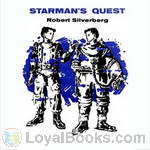 Starman's Quest
Starman's Quest
Travelling at speeds close to that of light, spacemen lived at an accelerated pace. When one of the twin boys left the starship, he grew older while his twin in space barely aged. So the starship twin left the ship to find what happened to his brother who was aging away on earth. | |
 Happy Unfortunate
Happy Unfortunate
Here are two early stories by the well known SF Author Robert Silverberg. The Happy Unfortunate was published first in Amazing Stories in 1957 and explores the angst caused when the human race reaches into space but at the cost of needing to breed a new species; specialized 'spacers' who can withstand the tremendous rigors of acceleration. The Hunted Heroes was published in Amazing stories a year earlier, in 1956. It is a futuristic story that holds great hope for the resilience of the human race after the war destroys most of the world. | |
By: Robert Silverberg and Randall Garrett (1935-) | |
|---|---|
 The Judas Valley
The Judas Valley
Why did everybody step off the ship in this strange valley and promptly drop dead? How could a well-equipped corps of tough spacemen become a field of rotting skeletons in this quiet world of peace and contentment? It was a mystery Peter and Sherri had to solve. If they could live long enough! [from the Judas Valley]Originally published in Amazing Stories, October 1956 | |
By: Robert Smythe Hichens | |
|---|---|
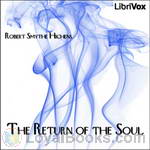 The Return of the Soul
The Return of the Soul
Can the soul of the dead come back to haunt the one who was responsible for its death? What would happen if the responsible one did not believe it could be so, and yet was in love with the returned soul? The Return of the Soul is a horror story of a man who is visited by the returning soul of a deceased, and who has some very perplexing issues to deal with upon that return. (Introduction by Roger Melin) | |
 Green Carnation
Green Carnation
The Green Carnation, first published anonymously in 1894, was a scandalous novel by Robert Hichens whose lead characters are closely based on Oscar Wilde and Lord Alfred Douglas - also known as 'Bosie', whom the author personally knew. It was an instant succès de scandale on both sides of the Atlantic. The book features the characters of 'Esmé Amarinth' (Wilde), and 'Lord Reginald (Reggie) Hastings' (Douglas). The words put in the mouths of the hero and his young friend in the story are mostly gathered from the sayings of their originals... | |
 Tongues of Conscience
Tongues of Conscience
Tongues of Conscience (1898) is a collection of five thought-provoking stories where an innocent, but selfish, action leads to horrific consequences. Robert Hichens writes some wonderfully evocative descriptions of nature: from a raw and exposed violent seascape, to the serene and idyllic countryside “…the violets seemed to sing in odours…” , to a train pushing through the white-out of a blizzard. In Sea Change an artist with a dark secret (“…I painted for him in words, the varying colors of waves in different seas… I drowned little Jack in the sea... | |
By: Robert Tressell | |
|---|---|
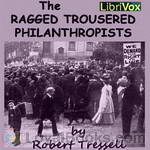 The Ragged Trousered Philanthropists
The Ragged Trousered Philanthropists
Clearly frustrated at the refusal of his contemporaries to recognise the iniquity of society, Tressell’s cast of hypocritical Christians, exploitative capitalists and corrupt councillors provide a backdrop for his main target — the workers who think that a better life is “not for the likes of them”. Hence the title of the book; Tressell paints the workers as “philanthropists” who throw themselves into back-breaking work for poverty wages in order to generate profit for their masters... | |
By: Robert W. Chambers (1865-1933) | |
|---|---|
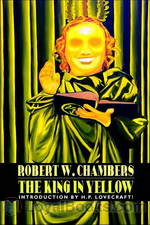 The King in Yellow
The King in Yellow
Robert W. Chambers (1865-1933) studied art in Paris in the late 80’s and early 90’s, where his work was displayed at the Salon. However, shortly after returning to America, he decided to spend his time in writing. He became popular as the writer of a number of romantic novels, but is now best known as the author of “The King In Yellow”. This is a collection of the first half of this work of short stories which have an eerie, other-worldly feel to it; but the stories in the second half are essentially love stories, strongly coloured by the author’s life as an artist in France... | |
 The Flaming Jewel
The Flaming Jewel
During the last two years, Fate, Chance, and Destiny had been too busy to attend to Mike Clinch. But now his turn was coming in the Eternal Sequence of things. The stars in their courses indicated the beginning of the undoing of Mike Clinch. In the North Woods, mayhem ensues as three parties vie for possession of the Flaming Jewel. Become immersed in the chasing and slinking to determine who will possess this famed jewel. Better than typical adventure writing magnificently describe the 19th Century Northeastern US in this great novel. | |
By: Robert W. Service (1874-1958) | |
|---|---|
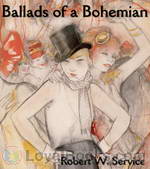 Ballads of a Bohemian
Ballads of a Bohemian
Ballads of a Bohemian is a collection of poems tied together by the narration of the “author” Stephen Poore. The poems speak of bohemian life in Paris before the war, his experiences during World War I and its aftermath. | |
 Selections from Ballads of a Cheechako
Selections from Ballads of a Cheechako
These twelve poems are from Ballads of a Cheechako which was Robert W. Service’s third book of Yukon poems, published in 1909. The word Cheechako, from Chinook Jargon, originated in the United States (Alaska) and Canada (Yukon) and was imported into local English during the Yukon gold rush that began in 1896. Cheechako, is a non derogatory word meaning “newcomer” or “tenderfoot.” The derivation looks something like this: chee new cha come ko home. | |
 Ottawa Folk Festival Robert Service Collection
Ottawa Folk Festival Robert Service Collection
The Spell of the Yukon by Robert Service with patrons, musicians and organizers. Robert Service is an iconic Canadian poet. | |
 Songs of a Sourdough
Songs of a Sourdough
Reputedly the best-selling poetry collection of the 20th century, 'Songs of a Sourdough' is best known for Robert W. Service's classic Yukon ballads, 'The Shooting of Dan McGrew' and 'The Cremation of Sam McGhee'. Service was born in Preston, Lancashire, and grew up in Scotland. In his twenties, he made his way to Canada and settled in the Yukon where he worked as a bank clerk but evidently dreamed of more adventurous pursuits. Service's readings of his poems show that he could adopt either a Scottish or North American accent. Here they are read in an accent that is not too far removed from the place of his birth. | |
By: Robert Williams Wood (1868-1955) | |
|---|---|
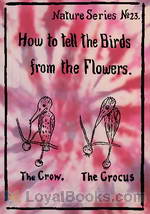 How to Tell the Birds from the Flowers
How to Tell the Birds from the Flowers
How do you tell apart a parrot from a carrot? A plover from a clover? A bay from a jay? Although there are several ways of differentiating, R. W. Wood’s use of pun and rhyme is one of the most entertaining! | |
By: Rolf Boldrewood (1826-1915) | |
|---|---|
 Robbery Under Arms
Robbery Under Arms
A tale of cattle duffing, horse stealing and bushranging in the New South Wales outback with Captain Starlight.To quote the author "though presented in the guise of fiction, this chronicle of the Marston family must not be set down by the reader as wholly fanciful or exaggerated. Much of the narrative is literally true, as can be verified by official records. A lifelong residence in Australia may be accepted as a guarantee for fidelity as to local colour and descriptive detail." | |
By: Romain Rolland (1866-1944) | |
|---|---|
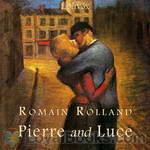 Pierre and Luce
Pierre and Luce
Pierre and Luce were an unlikely young pair who found themselves in the chaos of Paris during the war; Pierre, the shy, recently conscripted pacifist, and Luce, the free spirited artist in training, and both confused about the things going on around them. Why were these war birds flying overhead? Why these warning sirens, and occasional bombs exploding in the distance? Why did the government leaders, who didn't even know one another, hate and destroy so much? Why did these two delicate young adults find each other now? This story takes place between January 30 and Good Friday, May 29, 1918. (Introduction by Roger Melin) | |
By: Rosa Campbell Praed (1852-1935) | |
|---|---|
 Lady Bridget in the Never-Never Land
Lady Bridget in the Never-Never Land
Following a failed love affair in England, Lady Bridget O'Hara accepts an invitation to travel to colonial Australia as companion to Lady Rosamund Tallant, the wife of the newly-appointed governor of Leichardt's Land. In Leichardt's Town, Lady Bridget, also known as Biddy, is reunited with her old friend and collaborator, Joan Gildea, special correspondent for The Imperialist newspaper. While visiting Joan, Biddy meets Colin McKeith, a roughly-hewn, Scottish-born pioneer, drover, miner, sometime-politician, and magistrate in the north-eastern colony... | |
By: Rosanna Eleanor Leprohon (1829-1879) | |
|---|---|
 Afternoon in July
Afternoon in July
LibriVox volunteers bring you 14 recordings of An Afternoon in July by Rosanna Eleanor Leprohon. This was the Fortnightly Poetry project for July 7, 2013.Rosanna Eleanor Leprohon, born Rosanna Eleanor Mullins, was a Canadian writer and poet. She was "one of the first English-Canadian writers to depict French Canada in a way that earned the praise of, and resulted in her novels being read by, both anglophone and francophone Canadians."Leprohon's novels were popular in both English and French Canada in the late 19th-century, and were still being reprinted in French in the mid-1920s... | |
 Armand Durand
Armand Durand
Armand Durand, published in 1868, was written by Rosanna Leprohon, an English-speaker with an insider’s knowledge of French Canada, thanks to her Montreal education and marriage to a man from an old Québécois family. Paul Durand, a prosperous Québécois farmer, marries in quick succession two very different wives, and fathers two very different sons. The first son, Armand, delicate and bookish, is destined for a legal career in the city; the second, Paul Junior, tougher and down-to-earth, continues life on the farm... | |
By: Roswell Field (1851-1919) | |
|---|---|
 The Romance of an Old Fool
The Romance of an Old Fool
A light-hearted account of a successful middle aged widower who chances to visit the small town in which he grew up to renew old acquaintances and perhaps reflect on his successes since his departure.This visit, however, becomes far more to him than he would have imagined, as he finds that one of his dearest childhood girlfriends had died not long after his departure, and the widower envisions a relationship with none other than her daughter, who he senses to be her mother incarnate. | |
By: Roy Rockwood | |
|---|---|
 Dave Dashaway and His Hydroplane
Dave Dashaway and His Hydroplane
Never was there a more clever young aviator than Dave Dashaway. All up-to-date lads will surely wish to read about him. This second volume of the series shows how Dave continued his career as a birdman and had many adventures over the Great Lakes, and how he foiled the plans of some Canadian smugglers. (From the 1913 edition) | |
By: Rudolf Erich Raspe (1737-1794) | |
|---|---|
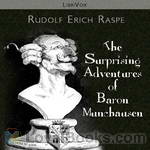 The Surprising Adventures of Baron Munchausen
The Surprising Adventures of Baron Munchausen
The stories about Münchhausen were first collected and published by an anonymous author in 1781. An English version was published in London in 1785, by Rudolf Erich Raspe, as Baron Munchhausen's Narrative of his Marvellous Travels and Campaigns in Russia, also called The Surprising Adventures of Baron Munchhausen. It is not clear how much of the story material derives from the Baron himself; however, it is known that the majority of the stories are based on folktales that have been in circulation for many centuries before Münchhausen's birth. | |
By: Rudyard Kipling (1865-1936) | |
|---|---|
 Kim
Kim
Present day readers live in a world that's emerged from the Cold War and the endless rivalry of the Super Powers but this book goes back and traces the origins of the conflict and mutual antagonism between nations. Kim by Rudyard Kipling is set against the background of the Great Game as it was called the tug-of-war between Britain and Russia for the control of Central Asia. The novel's action takes place during the Anglo-Afghan Wars of 1839-42. The novel's sweeping narrative, the depth of character and the sheer historical scale make it a first rate story... | |
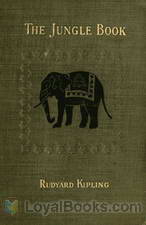 The Jungle Book
The Jungle Book
Originally written for his young daughter Josephine, who died tragically aged six, The Jungle Book by Rudyard Kipling is a collection of short stories which were published separately in magazines before being compiled into a book. The stories are in the form of fables, where animals communicate and speak to each other as humans do and the purpose of each story was to convey a moral or message to the reader. Modern readers would be more familiar with the Disney animated version in which Mowgli the little “man-cub” is raised by wolves... | |
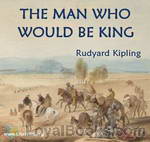 The Man Who Would Be King
The Man Who Would Be King
The Man Who Would Be King tells the story of two British adventurers in British India who become kings of Kafiristan, a remote part of Afghanistan. It was inspired by the exploits of James Brooke, an Englishman who became the “white Raja” of Sarawak in Borneo, and by the travels of American adventurer Josiah Harlan, who claimed the title Prince of Ghor. The story was first published in The Phantom Rickshaw and other Tales (Volume Five of the Indian Railway Library, published by A H Wheeler & Co of Allahabad in 1888)... | |
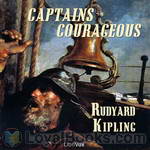 Captains Courageous
Captains Courageous
Real men don’t take guff from snotty kids. Neither does Disko Troop, skipper of the “We’re Here”, a fishing schooner out of Gloucester, Massachusetts, when his crew fishes Harvey Cheyne out of the Atlantic. There’s no place on the Grand Banks for bystanders, so Harvey is press-ganged into service as a replacement for a man lost overboard and drowned. Harvey is heir to a vast fortune, but his rescuers believe none of what he tells them of his background. Disko won’t take the boat to port until it is full of fish, so Harvey must settle in for a season at sea... | |
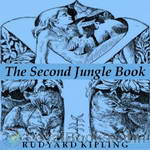 The Second Jungle Book
The Second Jungle Book
Kipling shows his love of the sub continent and its people and understanding of their beliefs in these tales. An older Mowgli roams the jungle with his old friends and investigates the ways of his people, a Prime Minister becomes wandering holy man, scavengers tell their tale and we leave India for the far,far north of Canada. | |
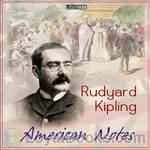 American Notes
American Notes
In American Notes, Rudyard Kipling, the Nobel Prize-winning author of the Jungle Book, visits the USA. As the travel-diary of an Anglo-Indian Imperialist visiting the USA, these American Notes offer an interesting view of America in the 1880s. Kipling affects a wide-eyed innocence, and expresses astonishment at features of American life that differ from his own, not least the freedom (and attraction) of American women. However, he scorns the political machines that made a mockery of American democracy, and while exhibiting the racist attitudes that made him controversial in the 20th century concludes “It is not good to be a negro in the land of the free and the home of the brave... | |
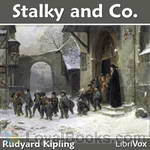 Stalky and Co.
Stalky and Co.
Rudyard Kipling published Stalky & Co. in 1899. Set at an English boarding school in a seaside town on the North Devon coast. (The town, Westward Ho!, is not only unusual in having an exclamation mark, but also in being itself named after a novel, by Charles Kingsley.) The book is a collection of linked short stories, with some information about the eponymous Stalky’s later life. Beetle, one of the main trio, is said to be based on Kipling himself, while Stalky may be based on Lionel Dunsterville... | |
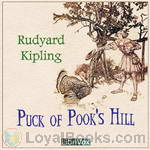 Puck of Pook's Hill
Puck of Pook's Hill
Puck of Pook’s Hill is a children’s book by Rudyard Kipling, published in 1906, containing a series of short stories set in different periods of history. The stories are all told to two children living near Pevensey by people magically plucked out of history by Puck. | |
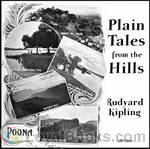 Plain Tales from the Hills
Plain Tales from the Hills
Named a "prophet of British imperialism" by the young George Orwell, and born in Bombay, India, Rudyard Kipling had perhaps the clearest contemporary eye of any who described the British Raj. According to critic Douglas Kerr: "He is still an author who can inspire passionate disagreement and his place in literary and cultural history is far from settled. But as the age of the European empires recedes, he is recognised as an incomparable, if controversial, interpreter of how empire was experienced. That, and an increasing recognition of his extraordinary narrative gifts, make him a force to be reckoned with." This force shines in THE PLAIN TALES FROM THE HILLS. (Introduction by Mike Harris) | |
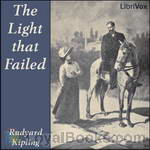 The Light that Failed
The Light that Failed
This novel, first published in 1890, follows the life of Dick Heldar, a painter. Most of the novel is set in London, but many important events throughout the story occur in Sudan or India. It was made into a 1916 film with Jose Collins and a 1939 film by Paramount starring Ronald Colman. | |
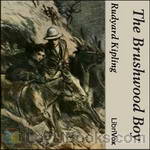 The Brushwood Boy
The Brushwood Boy
The experiences in public school, Sandhurst and military life in India of Major George Cottar together with his adventures in the dream world he discovers and frequents. | |
 Kipling Reader
Kipling Reader
These are selections of Kipling's writings; some poems, some fiction, some history but all by the master storyteller himself. Rikki-Tikki-Tavi' -- William the Conqueror, Part I -- William the Conqueror, Part II -- Wee Willie Winkie -- A matter of fact -- Mowgli's brothers -- The lost legion -- Namgay Doola -- A germ-destroyer -- 'Tiger! Tiger!' -- Tods' amendment -- The story of Muhammad Din -- The finances of the gods -- Moti Guj, Mutineer. | |
By: Rupert Brooke | |
|---|---|
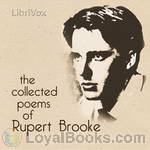 Collected Poems of Rupert Brooke
Collected Poems of Rupert Brooke
Rupert Chawner Brooke (August 3, 1887 – April 23, 1915) was an English poet known for his idealistic War Sonnets written during the First World War (especially The Soldier), as well as for his poetry written outside of war, especially The Old Vicarage, Grantchester and The Great Lover. He was also known for his boyish good looks, which prompted the Irish poet William Butler Yeats to describe him as “the handsomest young man in England”. | |
By: Saint Augustine of Hippo (354-420) | |
|---|---|
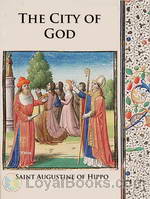 The City of God
The City of God
Rome having been stormed and sacked by the Goths under Alaric their king, the worshipers of false gods, or pagans, as we commonly call them, made an attempt to attribute this calamity to the Christian religion, and began to blaspheme the true God with even more than their wonted bitterness and acerbity. It was this which kindled my zeal for the house of God, and prompted me to undertake the defense of the city of God against the charges and misrepresentations of its assailants. This work was in my hands for several years, owing to the interruptions occasioned by many other affairs which had a prior claim on my attention, and which I could not defer... | |
By: Saki (1870-1916) | |
|---|---|
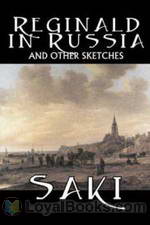 Reginald
Reginald
Saki was the pen name of the British author Hector Hugh Munro (1870 – 1916). His witty, biting and occasionally odd short stories satirised Edwardian culture. Saki is considered a master of the short story and has been compared to O. Henry and Dorothy Parker as well as Noel Coward and Oscar Wilde (who clearly influenced Saki). His first collection of short stories, Reginald, was published by Methuen Press in 1904 though these stories first appeared in the ‘Westminster Gazette’. The stories... | |
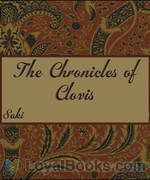 The Chronicles of Clovis
The Chronicles of Clovis
This is the third collection of short stories by Saki, following on from “Reginald” and “Reginald in Russia”. Although some of the stories have characters that do not appear elsewhere in the collection, many of them are loosely centred round the young Clovis Sangrail (effectively a reincarnation of Reginald). | |
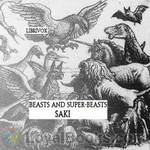 Beasts and Super-Beasts
Beasts and Super-Beasts
Saki (December 18, 1870 – November 14, 1916) was the pen name of British author Hector Hugh Munro. Saki’s world contrasts the effete conventions and hypocrisies of Edwardian England with the ruthless but straightforward life-and-death struggles of nature. Nature generally wins in the end. | |
 The Toys of Peace
The Toys of Peace
This is the fifth collection of short stories by Saki (H.H. Munro), and was published posthumously in 1923. Even so, many of the stories are quite up to the standard of those collected earlier. | |
By: Samuel Butler (1835-1902) | |
|---|---|
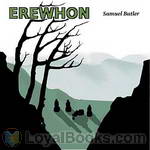 Erewhon
Erewhon
Erewhon, or Over the Range is a novel by Samuel Butler, published anonymously in 1872. The title is also the name of a country, supposedly discovered by the protagonist. In the novel, it is not revealed in which part of the world Erewhon is, but it is clear that it is a fictional country. Butler meant the title to be read as the word Nowhere backwards, even though the letters “h” and “w” are transposed. It is likely that he did this to protect himself from accusations of being unpatriotic, although Erewhon is obviously a satire of Victorian society. | |
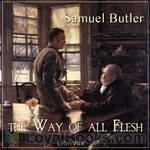 The Way of All Flesh
The Way of All Flesh
The Way of All Flesh (1903) is a semi-autobiographical novel by Samuel Butler which attacks Victorian-era hypocrisy. Written between 1873 and 1884, it traces four generations of the Pontifex family. It represents the diminishment of religious outlook from a Calvinistic approach, which is presented as harsh. Butler dared not publish it during his lifetime, but when it was published it was accepted as part of the general revulsion against Victorianism. | |
By: Samuel Gordon (1871-1927) | |
|---|---|
 Sons of the Covenant: A Tale of London Jewry
Sons of the Covenant: A Tale of London Jewry
Born in London's poverty-stricken and heavily Jewish East End, the Lipcott boys create their own successes in life and love. The brothers' commitment to improving the lives of working class people leads them to concoct The Scheme to help both the residents of their former neighbourhood and the Jewish people as a whole. The author stresses the responsibility of middle class Jews toward the Jewish poor. Consequently, this 1900 story has its preachy moments as well as some essentialised speculations about Jewish history and character... | |